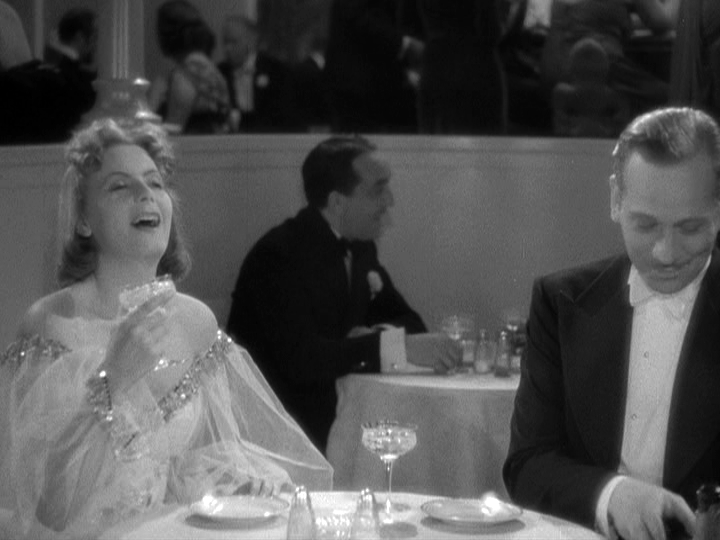Ninotchka, 1939, Metro-Goldwyn-Mayer. Starring Greta Garbo, Melvyn Douglas, Ina Claire. Directed by Ernst Lubitsch. B&W, 110 minutes.
After her three comrades are taken in by the pleasures of Paris, Nina Ivanovna “Ninotchka” Yakushova (Greta Garbo) is sent by the Russian government to complete their task of selling jewelry seized from the aristocracy during the Russian Revolution. Standing in her way is suave Count Leon d’Algout (Melvyn Douglas). He is representing the woman (Ina Claire) who claims to be the true owner of the jewels. The Count finds himself falling for Ninotchka, who, in her own cool, calculating way, begins to be seduced by both his charms and the sway of capitalism.
Ninotchka is practical and analytical, Count d’Algout is ardent and idealistic. The cold ideals of communism are faced with the bright lights of capitalism, and the hearts of all are quickened by the romance of Paris.

Greta Garbo, Melvyn Douglas
This was the first comedy for Garbo, and she was well-cast as the reserved Russian on a mission for the state. Her skills are put to good use in developing the character, and her delivery of some of the funniest lines is impeccable. As one of the finest actresses of her time, had she been given further opportunity in comedy, she may have been a shining light.
Studio executives were seeking an appropriate romantic comedy for Garbo, one with which they could use the line, “Garbo Laughs!” as a takeoff on the immensely popular “Garbo Talks!” marketing campaign used for her first talking film, Anna Christie. They approached Melchior Lengyel, who came up with this three-line synopsis of a story:
“Russian girl saturated with Bolshevist ideals goes to fearful, capitalistic, monopolistic Paris. She meets romance and has an uproarious good time. Capitalism not so bad, after all.”
Billy Wilder, Charles Brackett and Walter Reisch turned it into the Academy Award-nominated screenplay.

Greta Garbo
In what many consider to be the best year for films in the Golden Age of Hollywood (1939), Ninotchka was nominated for four Academy Awards: Best Picture, Best Actress (Garbo), Best Story (Melchior Lengyel) and, as mentioned above, Best Screenplay. It won none, but this was a year when it truly could be said, “it’s an honor just to be nominated.”
The timing of world events just prior to the release of Ninotchka played a part in its initial success. For years, Russia had been seen as a friend of the United States, and its anti-Nazi sympathies helped solidify the camaraderie. Being a communist sympathizer had not yet reached the point of being considered dangerous to the American way of life.
However, in August of 1939, Germany and Russia became allies, and anti-Nazi sentiment outweighed support of the Russian government or lifestyle. A political satire mocking this new-found enemy was timely.

Felix Bressart, Greta Garbo, Sig Ruman, Alexander Karlach
The satire remains fresh today. The performances of both stars as well as those of the numerous character actors, including the three men who played the Russians first sent to Paris, are strong and funny. Felix Bressart, whom Ernst Lubitsch also used with great effect in other films, such as The Shop Around the Corner and To Be or Not to Be, is particularly appealing. As is this film.

This is such a sharp, witty, and daring classic. I love it so much! I especially love the quote in the movie about corneas haha (can’t remember it exactly). Thanks for writing about it 🙂
As well, I am hosting a blogathon about Medicine in the Movies later in the month if you would like to join! https://charsmoviereviews.wordpress.com/2017/03/08/medicine-in-the-movies-blogathon-announcement-may-26-28-2017/
LikeLiked by 1 person
Thank you for your comment, and thank you for the invitation!
LikeLike
This looks interesting. I’ll have to check it out! Thanks!
LikeLiked by 1 person
[…] popular comedy actors of the time. Douglas had experienced tremendous success the year before with Ninotchka, and MacMurray was a regular in screwball comedies. Arthur was experiencing a bit of a slump, […]
LikeLike